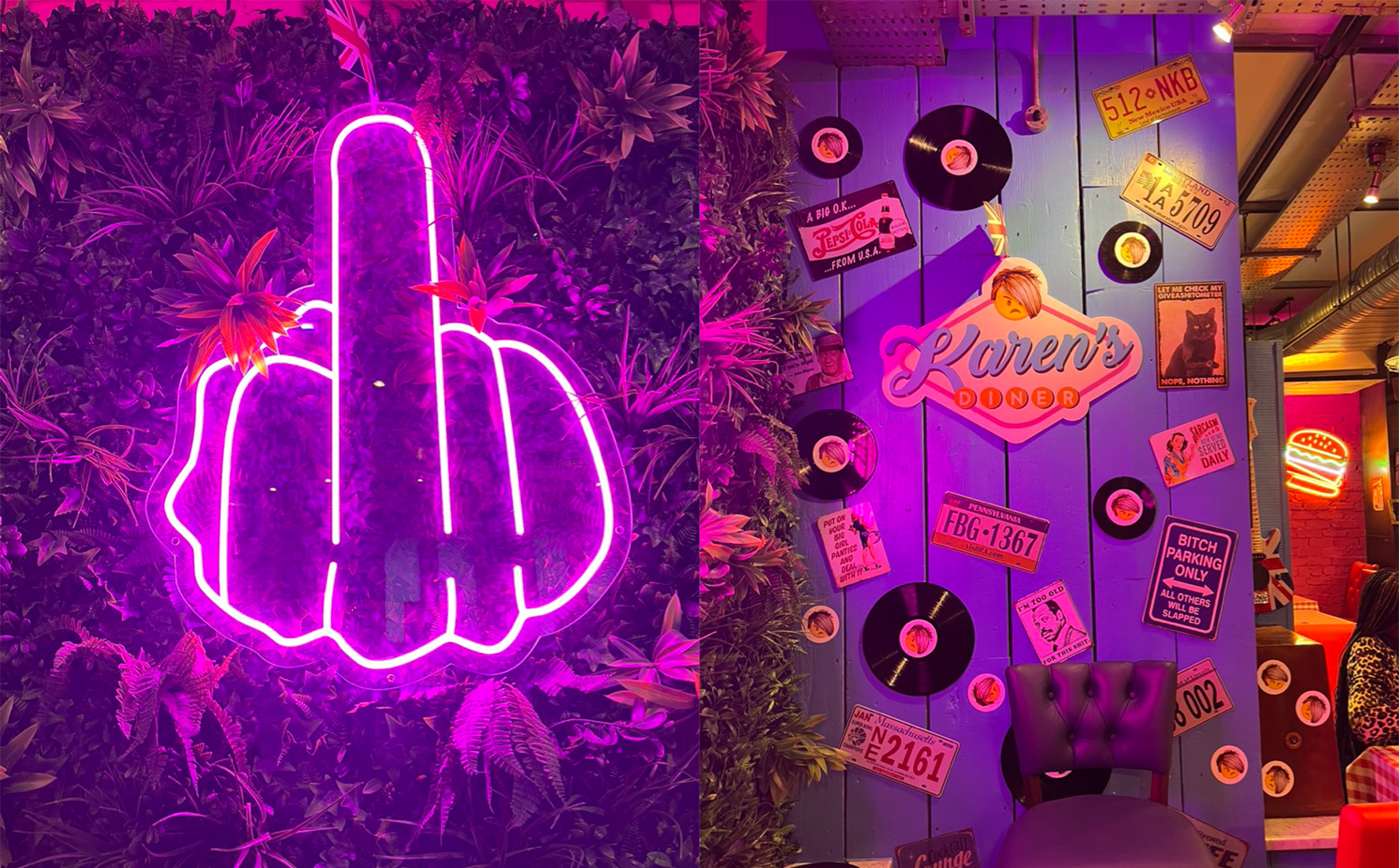What Rude Restaurant Service Taught Me About Hospitality
Dispatches from Karen's Diner, where the servers are intentionally catty to customers.
"Enjoy your meal, I guess," an indifferent employee greeted me as I walked into Karen's Diner, a newly opened addition to London's vibrant food scene.
A server grunted at us to take our seats at a table next to the kitchen, a spot that offers a perfect view of the rest of the customers who, like us, signed up for this. The inside of the diner is bubblegum pink, in sharp contrast to the otherwise less than bubbly service offered at this establishment.
Karen's Diner is an Australian-originating chain that invites customers to pay for an unpleasant dining experience full of intentionally rude servers. This concept was inspired by the infamous Karen archetype—a stereotypically privileged, almost always white female individual who lives to be rude to those she looks down on and picks fights at the slightest inconvenience.
It's important to note, however, that at Karen's, rudeness has its boundaries; these servers are professionals, after all, and their performance only goes so far. We were given a clear disclaimer upon entering the restaurant that no transphobic or homophobic comments would be made during our visit, and we were told to read the full list of rules on the website before our arrival. The aim is not to offend or hurt anyone; in fact, the restaurant seemingly exists to provide patrons with a jarring and eye-opening experience that challenges our notions of the service industry and the role of hospitality workers within it.
"Any restrictions?" another server asked as he slammed two glasses of ice water on our table.
"Yes, I'm vegetarian," I replied.
He instantly rolled his eyes like he'd been waiting for that answer and handed me a hat in the shape of a jalapeno to wear. "Eat some grass then," he retorted. He then began to walk away, but first turned to my husband.
"What on Earth possessed you to wear that jacket?" the server asked him, slapping a sticker reading "I STOLE THIS OUTFIT FROM MY NAN" on the lapel.

As our drinks quickly rolled out from the bar—Karen's food service was quick and seamless throughout the evening—the entertainment portion of the experience began. The performances aren't limited to the colorful tableside banter: There was an arm wrestling competition between a young child and a middle-aged woman, a fashion show of the worst-dressed customers, and an unfortunate contest to determine the least talented dancer. Soon, it was time to order our entrees.
I ordered the "Karen's Cousin, Twice Removed," a plant-based patty with lettuce, tomatoes, vegan cheese, and a thick layer of spicy aioli on a toasted bun. My husband ordered the "Basic Karen," which, according to him, was the perfect marriage of wagyu beef, swiss cheese, beetroot, and garlic mayo. The burgers came with a side of french fries, though I was sent to the back of the restaurant to fetch my own ketchup and mayonnaise.
"You can only take one," an employee growled, hovering over my shoulder to ensure I didn't overextend my condiment allocation. "Come back if you need more."
You might be wondering how Karen's Diner has managed not only to stay open, but to become a popular spot among locals and tourists alike. Stepping into the restaurant is like entering a parallel universe where traditional hospitality norms are reversed, which doesn't sound at all appealing. That is, until you pay a visit yourself.
Though the greetings and comments received are obviously exaggerated and sarcastic, it gave me an opportunity to reflect on how we treat those who serve us daily. Whether intentionally or not, customers often neglect to treat their servers with respect, though employees are trained to provide peak energy and impeccable customer service for each shift no matter how they're treated. There's even a term for it: situational value system, a social psychology phrase to describe people who treat others based on status and the "value" conferred to that other. In short, many customers treat waiters poorly because they perceive service workers to be inferior; by contrast, they might treat others of higher status better.
The intentionally rude behavior showcased at Karen's Diner compels me to question how aware we are of our own behavior toward service professionals and the insults they are exposed to, each of which is way worse than having to wear a silly hat.
Beyond the initial shock of being deftly insulted (an act that continued all evening long), there's an undeniable charm to the Karen's Diner experience. Despite their intentionally rude façade, the servers possess a remarkable ability to balance biting remarks with playful banter. We should always appreciate restaurant workers for what they bring to the table, literally. This unique dinner in Islington was a valuable reminder that hospitality is a two-way street, or ought to be. Enjoy your meal, I guess.
